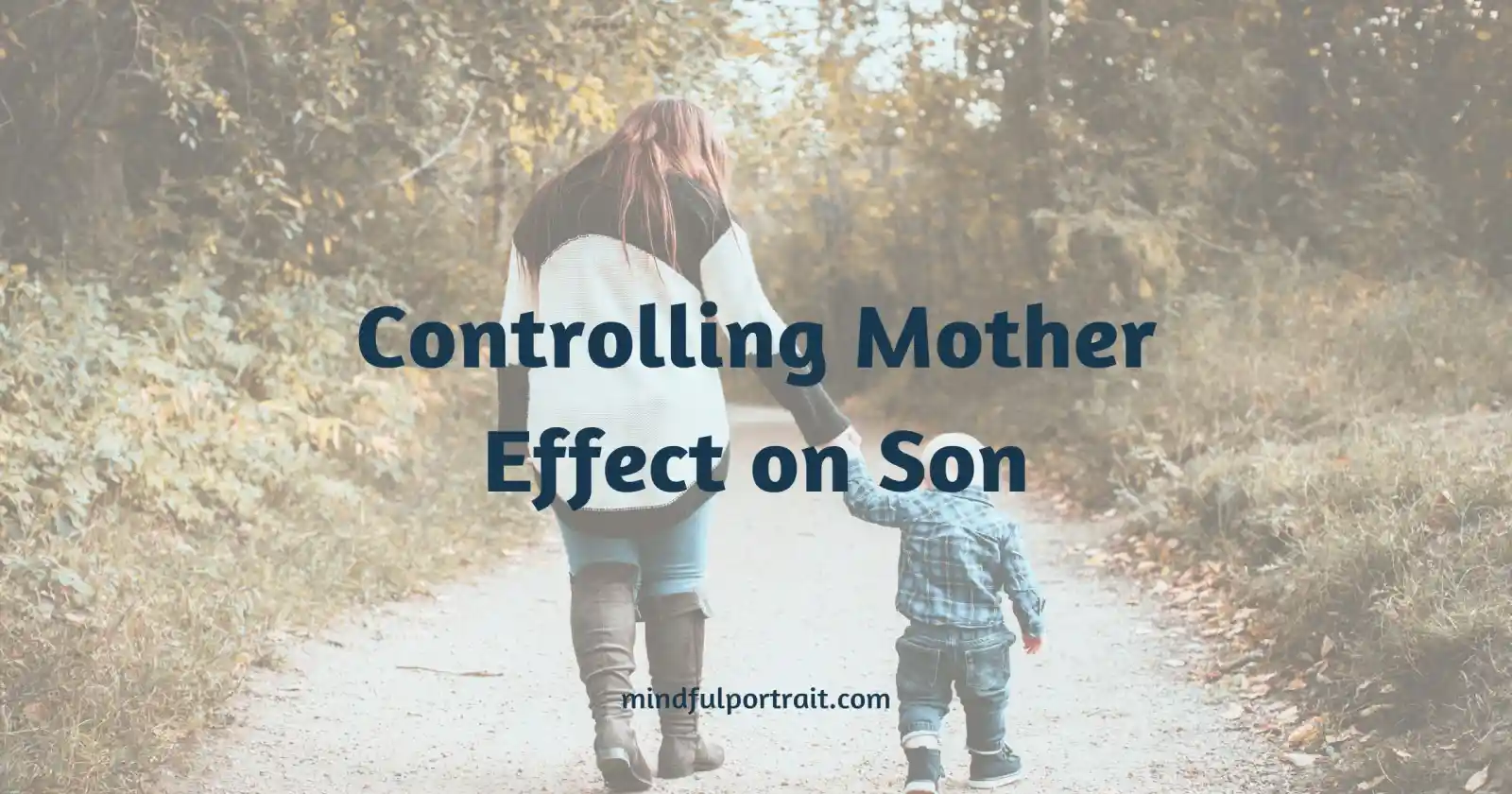Do the effects of a controlling mother on her son have a lasting impact on his adult life? The ‘mother wound’ is often discussed in relation to women, but the emotional struggles of men and the silent suffering of their partners are frequently overlooked. It’s high time men begin identifying and reflecting on their emotional and mental health, working to heal any negative effects of having a domineering mother. This healing process can help create healthier environments or relationships for everyone involved, including the partners and children of those men who may be indirectly affected by the mother wound.
Disclaimer: This article is for informational purposes only and is not a substitute for medical advice. If you or someone you know is experiencing mental health challenges, consult a healthcare provider or mental health professional for proper diagnosis and treatment.
Controlling Mother Effect on Son: Behavior Across His Life
“Mama’s Boy” is a term that reflects different emotions depending on age and context. When the child is young, it feels affectionate, playful, and reflects a close bond between mother and child. However, as the person grows, the term takes on a negative tone, implying dependence, immaturity, or over-reliance on their mother. This can lead to feelings of shame, resentment, or frustration. The same applies to a controlling mother’s behavior in her son’s life, highlighting the profound effects this dynamic can have over time.
Here are some examples of behaviors that illustrate the Controlling Mother Effect on Son
- A controlling mother dictates her son’s friendships, determining who he spends time with, for how long, and what they do together, often unjustly disapproving or blaming certain friends without valid reasons.
- She disregards or diminishes the father’s influence. Whether the father is passive or even abusive, the son is deprived of the opportunity to evaluate and understand the situation on his own.
- A controlling mother enforces strict, inflexible rules across all areas of her son’s life—dictating how he eats, dresses, his academics, lifestyle, future plans, hobbies, and daily routines—leaving little room for personal choice or independence.
- She employs guilt to manipulate his actions, making him feel responsible for her emotions. Through both direct and indirect emotional manipulation, she controls his thoughts, goals, understanding, and decisions.
- Her love appears conditional, causing the son to feel obligated to meet her expectations for validation. If he falls short, she may label him as “bad” and compare him to others, particularly a favored sibling.
- A controlling mother insists on being the most important person in her son’s life, constantly reminding him of the sacrifices she has made and guilt-tripping him whenever he attempts to assert independence.
- She remains the primary decision-maker, dictating everything from school admissions and extracurriculars to career goals and relationships, leading him to believe she knows best and making him fear that independence could result in failure or problems.
- Regardless of his age or circumstances, she demands constant updates on his life and whereabouts, even during urgent meetings or time spent with his own family. Learn more: Signs of a Smother Mother and Ways to Deal with It.
- She frequently interferes in his adult relationships, criticizing or undermining his partner, often feeling jealous of their bond and fearing a loss of control.
- Unsolicited advice, criticism, and micromanagement become an ongoing and unavoidable part of his life.
- She discourages emotional expression, believing that men should not cry or show vulnerability, dismissing his feelings as exaggerated or fake, which encourages him to suppress his emotions.
- She disregards boundaries and privacy, regularly crossing the line by reading his messages, opening packages, checking his room, or intruding on his romantic relationships.
Controlling Mother Effects on Son
- Bullying: He is often the target of bullying, either because of his low self-esteem or the “mama’s boy” image. Moreover, he faces emotional abuse from his mother as well as from his friends or society.
- Low Self Worth: As a result of the constant criticism, blame, and guilt-tripping he has faced since childhood, he believes he is unworthy of love and acceptance . He develops a habit of second-guessing himself and taking responsibility for every negative circumstance without even analyzing whose fault it is.
- Emotional Unavailability: The overwhelming reactions he experiences will make him emotionally unavailable, lacking empathy or compassion, unable to engage in deep conversations or connections, and struggling to express or understand his own emotions or those of others as an adult.
- Trust Issues: A mother has an irreplaceable place in everyone’s life, regardless of her traits. Therefore, breaking the mother-son bond can cause trust issues, especially with a life partner, leading to constant insecurity or doubts about her intentions or fear that she might leave him or not love him enough.
- Cognitive Impairment: As an effect of domineering mother behavior on the son, he might develop issues with cognitive skills like problem-solving, focus, and memory.
- Behavioral Issues: One of the harmful consequences of a domineering mother is the development of problematic behavioral patterns, such as hyperactivity, secrecy, defensive reactions, aggression, or a tendency to lie.
- Mental Health Problems: The pattern of criticism, unrealistic expectations, stress, and dependency can significantly impact mental health, potentially leading to anxiety disorders, depression, or mood disorders.
- Tendency to Try to Fit In or Play Cool: The son of a domineering mother may rebel by seeking relationships and lifestyles that appear free and exciting. Due to his limited exposure to different values because of his mother’s overbearing control, he often idolizes those who seem to live without restriction. This can lead him to make poor choices, thinking these behaviors are progressive or “cool,” while viewing his mother’s values as outdated.
- Addiction: The constant pressure to meet his mother’s expectations, stress, and the lack of love and warmth can lead the son to fall easily into unhealthy addictions like alcohol, substance abuse, or pornography as an escape from the emotional strain.
- Unhealthy Relationships: In their quest for validation and acceptance, they may easily enter relationships without proper analysis or consideration. Their focus tends to be on seeking time and love, often overlooking the essential values in the relationship.
- Normalizing Abuse or Narcissistic Traits: Growing up in such an environment, they may become attracted to or unconsciously invite narcissistic or abusive individuals into their lives. Sometimes, they even adopt these unhealthy behaviors themselves without realizing it.
- Parenting Style: Childhood trauma or abuse can significantly impact one’s own parenting style. This may include not knowing what is right or wrong, leading to the unintentional repetition of negative cycles. It can also result in a lack of empathy or emotional connection with one’s children, mirroring overbearing behaviors, or imposing similar unrealistic expectations and constant pressure to meet high standards.
- Relationship Issues: Sons of overbearing mothers are more prone to relationship difficulties due to unhealthy attachment styles, conflict avoidance, silent abuse, defensive behaviors, co-dependency, and people-pleasing tendencies. These patterns prevent them from forming healthy, balanced relationships.
- Intolerance To Rejection And Criticism: Due to the constant criticism faced during childhood, he may become emotionally drained and highly sensitive to criticism, making it difficult for him to accept even constructive feedback. The fear of rejection also becomes a significant challenge, as he may struggle to accept any form of rejection, even in situations as small as a child’s preference for one parent over the other.
- Consequences of the Absence of a Feminine Role Model: The mom.-son bond is important for every individual. The lack of a feminine figure in his life can make it difficult for him to understand and relate to women, especially in appreciating their values, recognizing their capabilities, and understanding the importance of mutual respect in relationships. This can lead to further consequences, such as overcompensating in relationships or a lack of respect, undermining women’s capabilities.
How to Deal with a Controlling Mother
- Recognize the Symptoms: Acknowledging the effects of an overbearing mother on a son is the first step towards breaking the cycle, healing the trauma, and encouraging personal growth. Start working towards it by understanding the root causes of the struggles and the consequences currently being experienced.
- Self-Care and Personal Growth: Take charge of your own growth and prioritize working on yourself. Once you’ve recognized the overbearing behavior in your mother and its impact on your life, aim to forgive rather than hate or blame her. Then start making a list of personal goals and identify what you want in life. Start your path towards self-discovery, exploring your personal choices, preferences, values, and life perspective. Dedicate specific time for “me-time” activities that help you de-stress, recharge, and deepen your connection with yourself.
- Building Healthy Relationships: Find and keep like-minded, positive people around you who accept you for who you are and help you progress in life. Set healthy boundaries in every relationship, and eventually, you’ll have a group of people to share your emotions and experiences with, and who support your growth.
- Channelize Your Energy: Find your own unique ways to alleviate emotional strain or exhaustion in a healthy way. Identify activities you enjoy and that help you recharge, such as exercise, photography, painting, etc. Exercise is always recommended because it can help you stay fit, release positive hormones, and contribute to personal growth. Finding the right outlet will not only help you manage stress but also elevate your well-being. Discover 30 Mindful Hobby Ideas for achieving a better mental health.
- Seek Therapy: When needed, seeking therapy and prioritizing mental health is a brilliant step. There is nothing to feel ashamed of or concerned about when getting therapy if it helps improve your quality of life. Check whether you are still struggling with the trauma or if you need your mother to undergo therapy. You can always think about seeking professional guidance.
- Be Open to Constructive Criticism: Consider criticism as positive feedback rather than viewing it as inadequacy. Similarly, accept challenges and face failures with confidence. Failures are a normal part of life, and feel confident about your own choices and decisions.
- Dealing With The Mother: Start by having open communication about your needs, boundaries, independence, and privacy. Be empathetic and try not to express yourself in a critical, hateful, or blaming tone. Instead, aim to discuss your needs in a calm and respectful conversation. Be prepared for emotional reactions, and teach yourself not to take anything personally or react emotionally. If she needs help, you can guide her toward resources or therapy, but be firm with your boundary setting. If you feel your mother is undermining your adulthood or family life, consider following the no-contact rule and learn when it’s appropriate to walk away and move on.
Reflections From Mindful Portrait

Having a “mom wound” is not a sign of weakness, nor is it something to be blamed for. In fact, recognizing this wound and committing to self-improvement is a true strength. Ignoring or rejecting these feelings, as well as dismissing positive criticism, is what can hold a person back. It’s never too late to focus on personal growth and self-discovery. Practicing awareness, self-compassion, and learning to forgive and move forward can definitely heal trauma of any extent.

